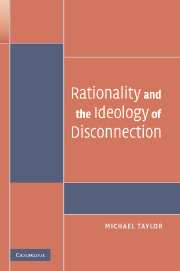Book contents
- Frontmatter
- Contents
- Preface
- Part one Attachments, reasons, and desires
- Part two Strokes of havoc: the market ideal and the disintegration of lives, places, and ecosystems
- Part three Living in unity, doing your part: rationality, recognition, and reciprocity
- 5 Introduction: doing your part
- 6 The rationality of reciprocity
- 7 Normativity, recognition, and moral motivation
- 8 Citizens and workers: the argument illustrated
- Index
- Title in the series
6 - The rationality of reciprocity
Published online by Cambridge University Press: 12 January 2010
- Frontmatter
- Contents
- Preface
- Part one Attachments, reasons, and desires
- Part two Strokes of havoc: the market ideal and the disintegration of lives, places, and ecosystems
- Part three Living in unity, doing your part: rationality, recognition, and reciprocity
- 5 Introduction: doing your part
- 6 The rationality of reciprocity
- 7 Normativity, recognition, and moral motivation
- 8 Citizens and workers: the argument illustrated
- Index
- Title in the series
Summary
Some experimental games
The ultimatum game
Suppose that you are given $100 but on the condition that you must agree with a total stranger on how it should be divided between the two of you. The stranger is in another place, and you must make him an offer – any amount between zero and $100. If he accepts the offer, he gets the amount you offered and you keep the remainder of the $100. But if he rejects the offer, the $100 will be withdrawn and neither of you will get anything. No further offers can be made; there is no communication between the two of you (apart from the communication of the offer); and there will be no further contact of any sort between you and no other consequences of your choices (of the size of the offer, of the decision to accept or reject it). Both of you – the proposer and the responder – know the total sum to be divided. In fact, both of you know all of these things and each knows that the other knows this to be the case.
If the responder is “rational” in the sense standardly assumed by economists and Rational Choice theorists, and is therefore interested solely in maximizing his monetary gain, he will accept any offer, however small. He cannot, after all, do anything else to increase his monetary gain from this situation and he will have no further contact with this stranger.
- Type
- Chapter
- Information
- Rationality and the Ideology of Disconnection , pp. 134 - 154Publisher: Cambridge University PressPrint publication year: 2006



